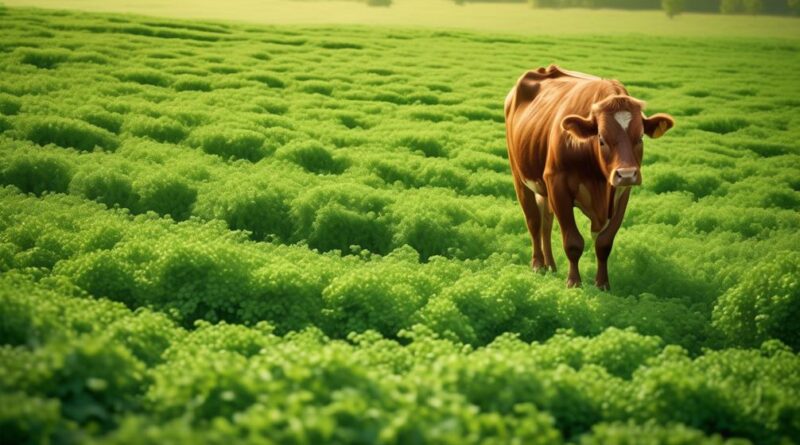Why Are High-Protein Forage Options Essential for Cattle?
So, you've probably heard that cattle can survive on just about any type of forage, right? Well, while that might be true to some extent, the real question is whether they can thrive on it.
Sure, they'll eat whatever is available, but if you want your cattle to be healthy, productive, and profitable, you need to consider the quality of their forage. And that's where high-protein forage options come into play.
But why exactly are they so essential for cattle? Well, let's just say that the benefits go beyond simply meeting their basic nutritional needs.
Protein Requirements for Cattle
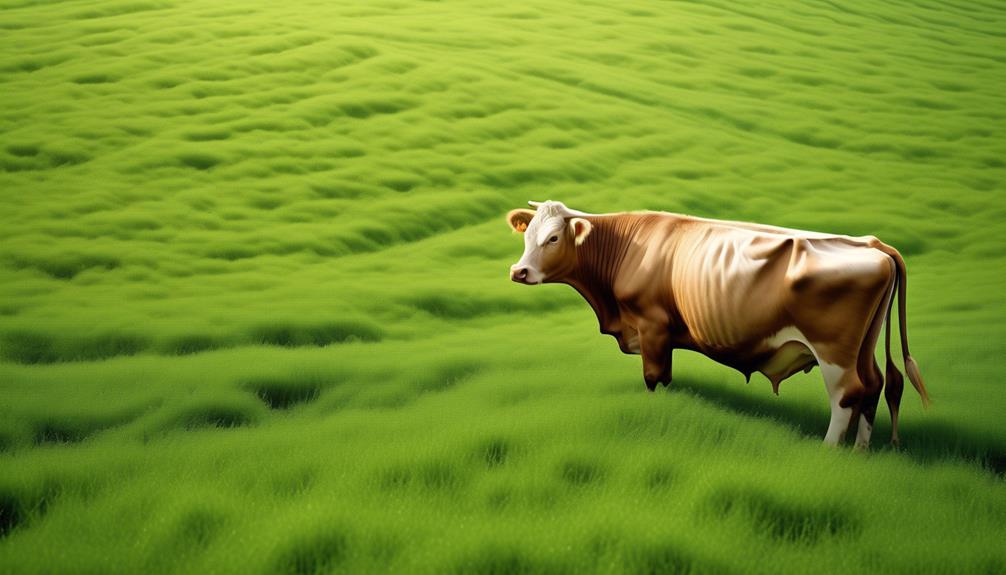
To ensure optimal health and performance, cattle require a balanced diet that includes sufficient levels of protein. Protein is essential for various bodily functions, including muscle development, immune system support, and overall growth. When it comes to cattle, protein plays a crucial role in their diet, as it directly impacts their ability to digest and utilize nutrients effectively.
Protein digestion in cattle is a complex process that involves the breakdown of dietary proteins into smaller components, such as amino acids, which are then absorbed and utilized by the body.
Achieving nutritional balance is key to meeting the protein requirements of cattle. It's important to provide sources of high-quality protein in their diet, such as forage options like alfalfa, clover, or soybean. These forages not only offer ample protein content but also aid in the overall digestive process, ensuring that the proteins are effectively broken down and absorbed.
Additionally, maintaining a proper balance of protein alongside other essential nutrients like carbohydrates, vitamins, and minerals is crucial for supporting cattle's growth, reproductive performance, and overall well-being.
Understanding the intricacies of protein digestion and nutritional balance in cattle is vital for ensuring that they receive the necessary dietary components for optimal health and performance. By providing high-protein forage options and maintaining a well-balanced diet, cattle can thrive and contribute to a sustainable and productive agricultural environment.
Benefits of High-Protein Forage
High-protein forage offers a multitude of benefits for cattle, including improved muscle development and overall health. When cattle have access to high-protein forage options, they experience a range of advantages that contribute to their well-being and productivity. Here are the key benefits:
- Enhanced Protein Supplementation: High-protein forage provides essential amino acids, promoting muscle growth and repair, ensuring your cattle are strong and healthy.
- Improved Grazing Behavior: Cattle are more likely to actively graze and forage when provided with high-protein options, leading to better nutrient intake and overall satisfaction.
- Optimized Digestive Efficiency: The high-protein content in forage aids in optimizing the digestive process, ensuring that your cattle can efficiently extract the necessary nutrients from their feed.
- Enhanced Rumen Health: High-protein forage promotes a healthy rumen environment, which is crucial for the overall digestive health and well-being of your cattle.
- Increased Milk Production: For dairy cattle, high-protein forage can lead to increased milk production, benefiting both the cattle and your dairy operations.
Impact on Cattle Health
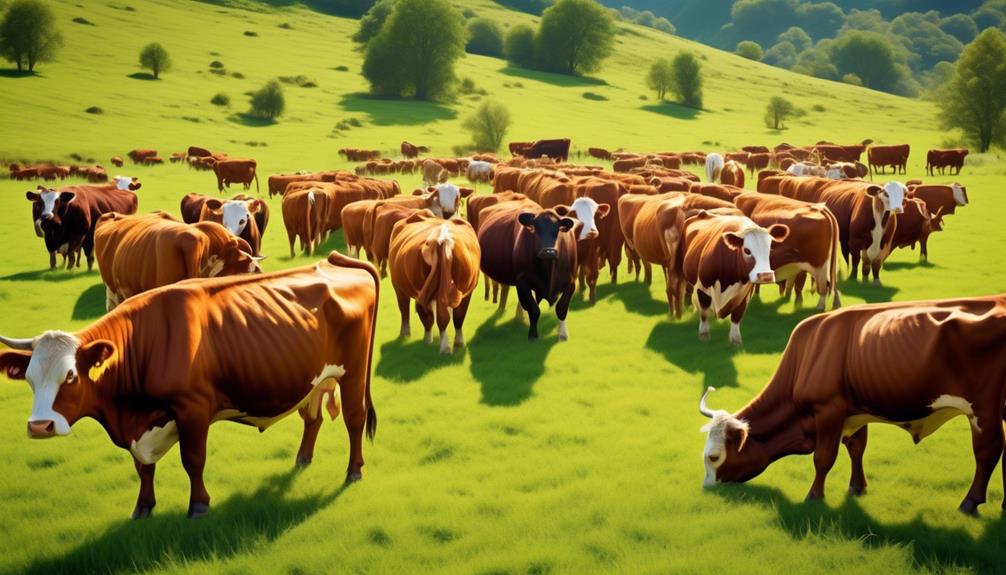
The benefits of high-protein forage extend beyond improved muscle development and grazing behavior for cattle, directly impacting their overall health and well-being. When cattle have access to high-protein forage options, their health and performance improve significantly. The nutritional balance provided by high-protein forage plays a crucial role in maintaining the overall health of cattle. It ensures that they receive the essential nutrients necessary for optimal bodily functions, leading to improved cattle performance.
High-protein forage contributes to cattle's health by supporting their immune system, promoting better digestion, and aiding in weight management. The rich protein content helps in maintaining muscle strength and promotes faster recovery from illnesses or injuries. Additionally, the balanced nutrition derived from high-protein forage aids in maintaining healthy metabolic functions, reducing the risk of metabolic disorders in cattle.
Furthermore, high-protein forage options play a vital role in ensuring that cattle receive the necessary amino acids, vitamins, and minerals for overall well-being. This balanced nutritional intake helps in preventing deficiencies that may lead to health issues, ensuring that cattle remain healthy and active. Proper nutritional balance from high-protein forage also supports the development of a strong and resilient immune system, reducing the likelihood of diseases affecting the cattle.
Improving Cattle Weight Gain
Boost your cattle's weight gain by incorporating high-protein forage options into their diet to ensure optimal growth and development. Improving cattle weight gain is crucial for the success of your livestock operation. By focusing on protein supplements and implementing effective grazing management, you can significantly enhance the weight gain of your cattle.
Consider the following to optimize your cattle's weight gain:
- Protein Supplements: Introduce protein supplements into your cattle's diet to meet their elevated protein requirements. This will support muscle development and overall weight gain, ensuring that your cattle reach their full potential.
- Balanced Nutrition: Provide a balanced diet that includes high-protein forage options to ensure that your cattle receive the essential nutrients needed for healthy weight gain.
- Grazing Management: Implement strategic grazing management practices to optimize the availability of high-protein forage options for your cattle. Rotational grazing and proper stocking rates can ensure that your cattle have access to quality forage throughout the grazing season.
- Regular Monitoring: Keep a close eye on your cattle's weight gain progress. Regular monitoring allows you to make timely adjustments to their diet or grazing management, ensuring that they consistently gain weight at a healthy rate.
- Consultation with a Nutritionist: Seek guidance from a professional nutritionist to develop a customized feeding program that addresses the specific weight gain needs of your cattle based on factors such as age, breed, and environmental conditions.
Quality Forage for Cattle Nutrition
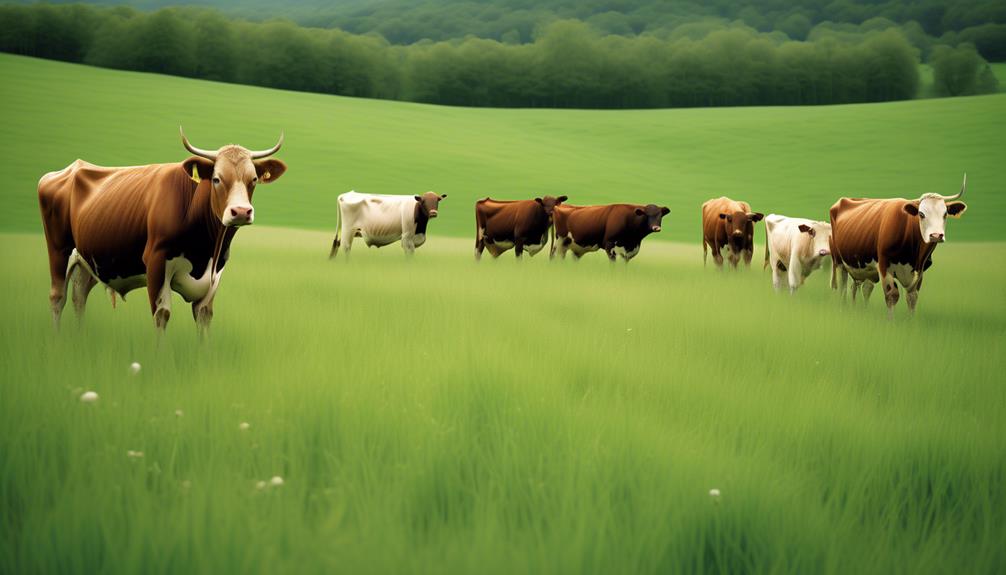
To further optimize your cattle's nutrition, focus on integrating quality forage options that complement their protein supplements and contribute to healthy weight gain. Quality forage plays a crucial role in meeting the nutritional needs of your cattle. Understanding your cattle's grazing behavior is essential for providing them with the right forage options. Cattle are natural grazers, and their grazing behavior influences their nutritional intake. By offering quality forage, you can ensure that your cattle have access to the necessary nutrients to support their overall health and weight gain.
Moreover, the digestive system of cattle is well-equipped to process high-quality forage. Their digestive system consists of a four-compartment stomach that's specifically designed to break down fibrous forage materials. By providing quality forage, you can support the efficient functioning of their digestive system, leading to better nutrient absorption and utilization.
When selecting forage options, consider the nutritional content and palatability to ensure that your cattle receive the essential nutrients they need and are encouraged to consume adequate amounts. It's important to monitor your cattle's forage intake and adjust the options based on their nutritional requirements and grazing behavior.
Forage Variety for Protein Intake
When selecting forage options for optimal protein intake, consider the diverse variety available to meet your cattle's nutritional needs and promote healthy growth. Maximizing protein intake is crucial for the overall health and productivity of your cattle. Here are some forage varieties to consider for ensuring your cattle receive the necessary protein:
- Alfalfa: This legume forage is rich in protein and highly digestible, making it an excellent choice for promoting growth and milk production in cattle.
- Clover: With its high protein content, clover is a valuable forage option that can help boost your cattle's protein intake, supporting their overall health and well-being.
- Bermudagrass: This warm-season forage option offers good protein levels and can be a valuable component of your cattle's diet, especially during the summer months.
- Ryegrass: Consider incorporating ryegrass into your forage options, as it provides a reliable source of protein for your cattle, contributing to their nutritional requirements.
- Soybeans: Including soybeans in your forage selection can significantly enhance your cattle's protein intake, supporting their growth and development.
Carefully selecting a variety of forages can ensure a well-rounded diet for your cattle, meeting their protein needs and contributing to their overall health. By offering a diverse range of forage options, you can provide your cattle with the essential nutrients they require for optimal growth and performance.
Protein-Rich Forage Sources
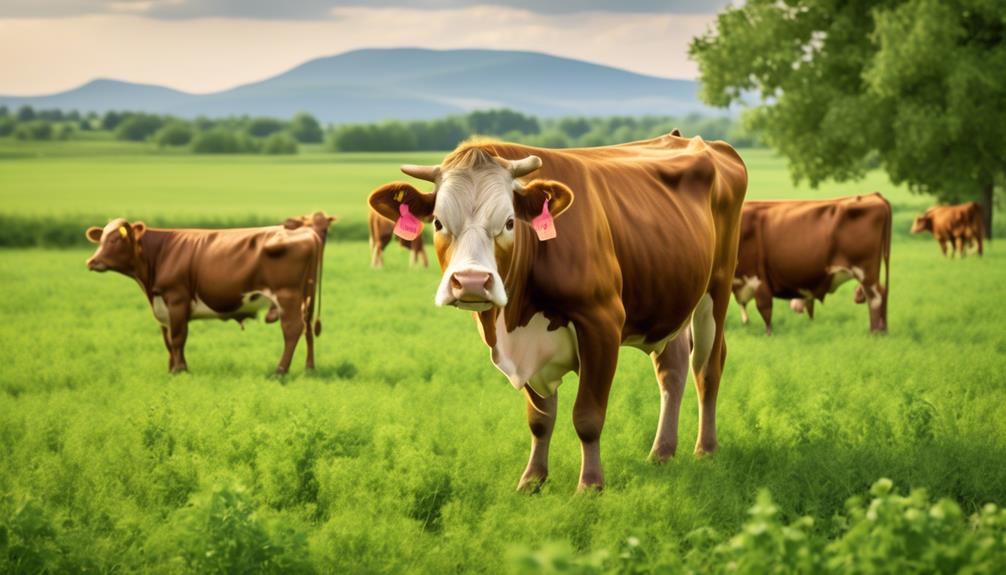
One effective way to ensure your cattle receive sufficient protein intake is by incorporating protein-rich forage sources into their diet. Forage selection plays a crucial role in providing your cattle with the necessary nutrients, particularly protein. When considering forage options, it's essential to focus on both digestibility and protein content to maximize the benefits for your cattle.
Grazing management is key to optimizing protein intake for your cattle. By strategically planning when and where your cattle graze, you can ensure access to high-protein forage sources at the right times. This involves rotating pastures and managing stocking rates to prevent overgrazing, which can deplete the availability of protein-rich forage.
When it comes to forage selection, consider incorporating legumes such as alfalfa, clover, and lespedeza into your pastures. Legumes are known for their high protein content and excellent digestibility, making them valuable additions to your cattle's diet. Additionally, including forage species like fescue and Bermuda grass can contribute to a well-rounded, protein-rich forage base for your cattle.
To further enhance protein intake, consider supplementing your cattle's forage diet with protein-rich feeds during periods of low forage quality. By paying close attention to forage selection, grazing management, digestibility, and protein content, you can ensure that your cattle receive the protein-rich forage they need for optimal health and productivity.
Managing High-Protein Forage
A crucial aspect of optimizing protein intake for your cattle involves effective management of high-protein forage sources. To ensure your cattle receive the most benefit from high-protein forage, consider the following:
- Implement Nutrient Management: Regularly assess the nutrient content of your forage to ensure it meets the protein requirements of your cattle. This proactive approach allows you to make adjustments to the feeding regimen as necessary and ensures your cattle receive the necessary nutrients for optimal health and productivity.
- Utilize Grazing Techniques: Employ rotational grazing techniques to manage high-protein forage. This approach allows forage to regrow, ensuring a continuous supply of high-protein feed for your cattle. It also helps prevent overgrazing and promotes sustainable forage management.
- Conduct Forage Analysis: Regularly analyze the forage to determine its protein content. This information is vital for making informed decisions regarding protein supplementation. By understanding the quality of the forage, you can effectively supplement with additional protein sources when needed, ensuring your cattle's nutritional needs are met.
- Protein Supplementation: When necessary, supplement your cattle's diet with high-quality protein sources to ensure they receive adequate protein intake. This is particularly important during periods of low forage protein content or increased nutritional requirements, such as during lactation or growth.
- Monitor Cattle Response: Regularly observe and monitor your cattle's response to the high-protein forage and any supplementation. This allows for adjustments to be made promptly, ensuring your cattle thrive on a well-managed, high-protein forage diet.
Frequently Asked Questions
What Are the Specific Protein Requirements for Different Breeds of Cattle?
When considering specific breed, protein requirements vary. Understanding cattle's nutritional needs is crucial for maintaining cattle health. Incorporating high protein forage into their diet can aid weight gain strategies and overall well-being.
How Does the Availability of High-Protein Forage Impact the Overall Cost of Raising Cattle?
When high-protein forage is available, you'll see cost savings due to improved feeding efficiency and meeting market demand. The nutritional benefits of high-protein forage contribute to overall cattle health and productivity.
Can High-Protein Forage Options Help Prevent Certain Health Issues in Cattle, Such as Bloat or Acidosis?
High-protein forage options can help prevent bloat and improve digestion in cattle. By incorporating these options into their diet, you can reduce the risk of health issues and promote better overall well-being for your herd.
Are There Specific Strategies for Introducing High-Protein Forage Into a Cattle's Diet to Maximize Weight Gain?
To maximize weight gain, introduce high-protein forage supplements gradually into your cattle's diet. Adjust the feeding schedule to ensure they receive enough of the supplement. This approach helps them adapt to the new forage and promotes healthy weight gain.
How Do Different Types of Forage, Such as Legumes or Grasses, Compare in Terms of Their Protein Content and Impact on Cattle Nutrition?
When comparing legumes and grasses, consider their protein content and impact on cattle nutrition. Legumes typically have higher protein content, making them beneficial for cattle. Grasses can also provide protein but may require additional supplementation for optimal nutrition.
Conclusion
So, make sure to provide high-protein forage options for your cattle. It's essential for their health, weight gain, and overall nutrition.
Keep a variety of protein-rich forage sources available and manage their intake to ensure your cattle are getting the best nutrition possible.
Your efforts will pay off with healthier, happier cattle and better overall herd performance.
